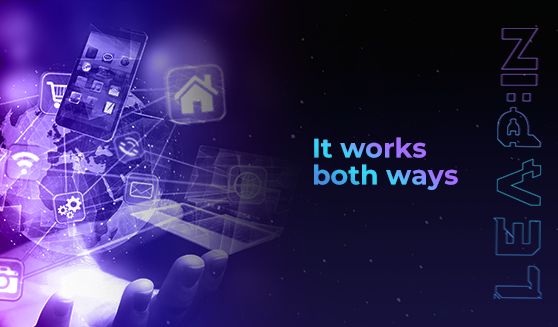
3 Tech sectors facing a talent shortage in 2025
Discover three tech sectors facing a talent shortage this year. Could you find your ideal role in a high-demand sector like cybersecurity, cloud computing, or artificial intelligence?


Welcome to this week’s LEAP:IN newsletter. Each week, we unpack leader’s powerful quotes and decipher the tech landscape. With exclusive content from some of the world’s leading experts in AI, robotics, space, edutech, climate tech and more, read on to discover this week’s insights and subscribe to receive weekly updates direct to your inbox.
This week we’re quoting…
Lord Stephen Carter (Group CEO at Informa)
What Carter said:
“If you look backwards over the last thirty years, technology — both consumer technology and enterprise technology — has been a powerful force for good. Connectivity has been a powerful force for good. Applications in education, in healthcare, in entertainment, in media, have been a powerful force for democratisation, for liberation, for transparency. We may feel uncomfortable at times with some of the transparency, but that transparency shines a light on things that require us to justify, rather than merely to defend.”
Is transparency really a force for good?
How tech drives transparency
In their 2012 book Extreme Trust, Don Peppers (Co-Founder at CX Speakers) and Martha Rogers Ph.D wrote:
“Transparency increases the cost of hiding the truth. More efficient interactivity exposes truths that used to be inexpensive to hide.”
And in a nutshell, that sums it up pretty well. As digital tech makes it harder to make information inaccessible, it becomes very expensive for companies and organisations (and sometimes individuals) to cover up the details of their operations.
More and more, modern technology demands transparency. It requires openness. And while that brings up issues and vulnerabilities, it also has huge potential to make things better.
It’s happening alongside a citizen demand
Just as tech demands transparency, so too do the people.
Especially young people — a 2021 report by PR firm 5WPR found that 45% of Gen Z have boycotted a business because of its stance on a social or environmental issue. And the Deloitte Global 2022 Gen Z and Millennial survey found that today 40-and-unders are expecting more action, and more accountability, from both governments and businesses.
Transparency through tech isn’t happening in a vacuum. It’s happening because people are asking for it. Or people are asking for it because it’s happening? Either way, there’s a symbiotic agreement between digital tech and global culture as we shift into our post-pandemic world: transparency is non-negotiable.
Watch the video: Lord Stephen Carter on how LEAP is revolutionising the tech industry
And…
Peggy Johnson (CEO at Magic Leap)
What Johnson said:
“I think we’re just now seeing what devices can do. If users don’t see value in this technology, if it’s just an innovative thing, it’s not going to go anywhere. So we are just now able to show real value in these technologies, which has been the missing link. “
What was Johnson talking about?
AR tech, specifically. But the idea that a new technology will only succeed if it’s actually valued by users isn’t exclusive to AR — it’s relevant to all tech.
And how do you tell the difference between an ‘innovative thing’ and high-value tech?
It starts with the ‘why’.
Why is this tech being developed, and who’s it for? What’s its purpose? What’s the big-picture vision?
If the vision is to improve lives in some way; to increase equality, convenience, connectivity, accessibility; even to save lives; then there’s clearly real value there. Although that doesn’t mean everyone will see the value instantly.
Value can be obscured by other uses
Johnson said that when users can’t see or understand the value of a technology, that’s the missing link that stops the tech from taking off. But sometimes that understanding can be obscured or obliterated when the same tech can be used for bad stuff.
Like drones: they can definitely be used for good. San Francisco startup Zipline, for example, is using drones to deliver lifesaving bags of blood supplies (plasma, platelets, and red blood cells that are needed for transfusions) to remote or inaccessible parts of Africa.
But drones get more airtime in the context of weapons and war — which obscures their value, and means it’ll take longer for drones to be accepted as a force-for-good tech.
Is it true that new tech won’t be successful if people can’t see its value?
Yes. As David Mounts (Forbes Councils Member) put it, digital transformation isn’t really about technology, but about how people, businesses, and governments use (or don’t use) that tech. A new technology transcends its mechanisms and functions and becomes successful when it…
People don’t like tech because it’s clever. They like tech when it works for them.

Discover three tech sectors facing a talent shortage this year. Could you find your ideal role in a high-demand sector like cybersecurity, cloud computing, or artificial intelligence?

We’ve gathered advice from tech leaders to help you find your career in tech – so you can get in, stay in, and thrive.

Tan Wooi Leong (Managing Director, Energy and Industrial at Surbana Jurong) says collaboration is critical to drive progress in clean energy transformation. Discover the latest clean energy tech developments this year.

Discover three tech sectors facing a talent shortage this year. Could you find your ideal role in a high-demand sector like cybersecurity, cloud computing, or artificial intelligence?

We’ve gathered advice from tech leaders to help you find your career in tech – so you can get in, stay in, and thrive.

Tan Wooi Leong (Managing Director, Energy and Industrial at Surbana Jurong) says collaboration is critical to drive progress in clean energy transformation. Discover the latest clean energy tech developments this year.